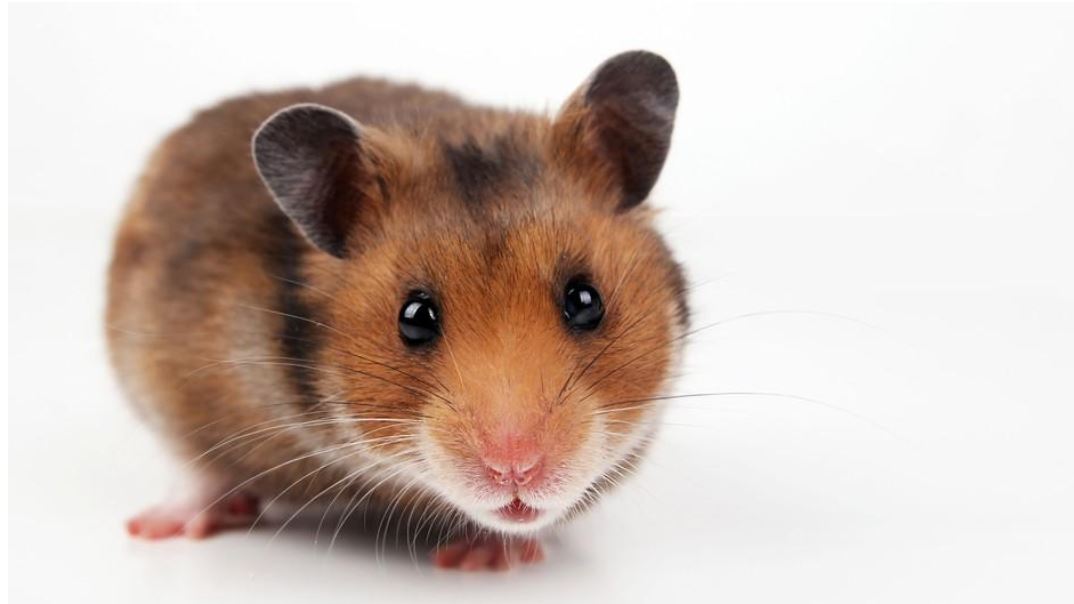Hamsters can make great little pets but can require more work than you might think. They live an average lifespan of only 2-3 years and, depending on breed, can grow up to 4-7 inches long and weigh 100-150 grams. They are nocturnal animals, meaning they sleep during the day and are active at night. This makes them the perfect companion for night-owls. This also means you probably shouldn’t have their cage in your bedroom as they will likely keep you up at night.
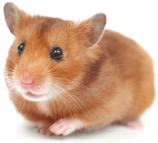
The most common breed of hamster that is kept as a pet is the Syrian hamster. They are more commonly referred to as golden hamsters or teddy bear hamsters and are considered to be the friendliest option for families with children. It is important to note however that while Syrian hamsters don’t typically nip at their owners, they will turn violent in pairs and fight over territory. For this reason, hamsters should always be housed alone.
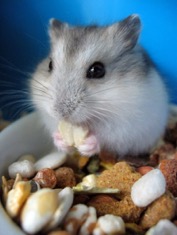 DIET
DIET
In the wild, hamsters feed on plants, seeds, fruit, and insects. The current diet recommendation for pet hamsters is pelleted rodent ration with 15-20% protein, sometimes sold in dry block form. Seed diets are also available for hamsters; however, they tend to be high in fat and can lead to obesity and calcium deficiencies when fed alone.
Other supplements and treats that can be given in moderation include fresh fruits and vegetables, sugarless breakfast cereals, and cheese. Recommended fruits and veggies include broccoli, apples, pears, parsley, carrots and turnips. Avoid onions, garlic, chives, leeks, lettuce, potatoes, and oranges. A clean stick of fruitwood to chew on can also help wear their growing teeth down.
They should always have fresh water available to them as well, most easily via sipper bottles on their cage. Make sure the sipper tube is low enough that the hamster can comfortably reach it and that the water is changed at least once daily.
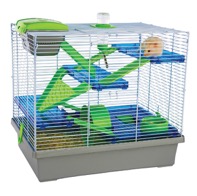 HOUSING
HOUSING
There are several types of hamster cages available. They do best with wire, stainless steel, durable plastic or glass. Glass and plastic cages do however have poorer ventilation, so these habitats should have at least one side open for air circulation to prevent high humidity, high temperature, and odour concentration. Materials such as wood, light plastic, and soft metal should be avoided because hamsters love to chew and can chew through them. Rounded corners are also best for this same reason.
Cage accessories are a must with these little guys! Exercise wheels are the best choice to keep your hamster happy and avoid boredom. Solid plastic wheels are safer than wheels made of wire. You can also purchase a large plastic ball to put your hamster in so they can run around a room and explore. This can be great fun for them but, of course, this should always be done under your supervision.
Other great options for your hamster include tunnels and nesting boxes. If you have a habitat with plastic tubing for tunnels, make sure they are big enough that your hamster won’t be at risk of getting stuck.
Providing them with deep bedding will also allow them to burrow. Bedding should be clean, non-toxic, absorbent, and dust-free. Recommended examples include shredded paper, shredded tissue, wood shavings, and processed corn cob. If you are using wood shavings or corn cob, it should always be inspected for mould, mildew or other contaminants before using. Avoided any scented bedding, which contains chemicals that can cause respiratory issues, as well as clumping litter that can cause digestive issues in your little hammy.
The cage and all accessories should be cleaned with regular soap and water one to two times per week. Bedding should be completely changed on a weekly basis as well.
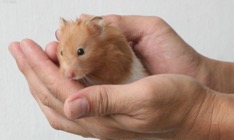 HANDLING
HANDLING
Hamsters should be picked up by gently cupping them in one or both hands and holding them against your body.
Many people believe that all hamsters are aggressive and will bite, however, hamsters that are frequently handled from a young age usually remain quite docile and friendly. If a hamster is new to you and you are unsure of its personality, always use caution when approaching in case they haven’t been handled much before and may want to bite or turn aggressive. Even docile hamsters may bite if surprised or awakened, so keep this in mind.
Written by Stephanie, RVT


